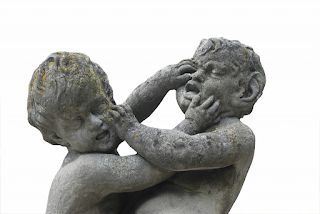Like most adults, the day had come when I felt incapacitated by my to-do list. I had homework, housework, a puppy to manage, and a husband to bond with and I didn't know where to start. I ended up breaking down in the shower, and as I talked to myself, I came up with my three wishes. They weren't general helps, like more patience or more time; I wanted someone to walk Zoe, to make dinner, and to wash the mountain of dishes. Everything else, I felt I could manage. If Zoe wasn't jumping on me, I could study better. If the mountain of dishes wasn't judging me, I could clean the rest of the apartment in peace, etc. If only someone could come and magically grant my wishes.
My wishes were granted, but it wasn't magic. I messaged my husband, letting him know that I couldn't make dinner, so he could decide if he wanted to get something or make something. He came home and cooked! Wish number one. I found an assignment that involved watching a documentary and watched that as I washed the dishes. Wish number two. The next day, I decided that it was important to take time for Zoe, so I took her on a walk. Wish number three! When I realized that I had granted my own wishes (with help from my husband), it was so empowering. I had managed to grant not only those wishes but finish my other responsibilities as well. It reminded me of one of my favorite quotes, by Phillip Brooks:
“Do not pray for easy lives. Pray to be stronger men. Do not pray for tasks equal to your powers. Pray for powers equal to your tasks. Then the doing of your work shall be no miracle, but you shall be the miracle."
In Numbers 14, Moses and the children of Israel finally have the Promised Land within their reach. But then the spies that Moses sent to scout for the fruits of the land come back with bad news--the land is already populated by giant, strong men. The spies and many of the people lose faith in the power of God and despair. "Would God that we had died in the land of Egypt! or would God we had died in this wilderness!" (vs. 2). How incredible that these people, having seen all they have seen of God's power, would give up on Him. The Lord says, "how long will it be ere they believe me, for all the signs which I have shewed among them?" (vs. 11) Joshua and Caleb try to reassure them and reanimate their faith: "The land, which we passed through to search it, is an exceeding good land. If the Lord delight in us, then he will bring us into this land, and give it us; a land which floweth with milk and honey. Only rebel not ye against the Lord, neither fear ye the people of the land..." (vs. 7-9)
Sometimes life is overwhelming. Our Promised Land might look beautiful, but it requires faith and work to get there. Are we willing to trust in the Lord? Are we willing to look past the challenges and into the beauty that we're fighting for?
There is a second part to the story from Numbers 14. After being told that they wouldn't be able to enter the Promised Land, a group of people decided not to wait. They decided to go in their own strength to take the land. Moses warned them that they were going against the word of God and wouldn't have Him with them. But they went anyway and were killed.
At the time when I made my three wishes, I was preparing for a book discussion on "The Tao of Pooh," which discusses Taoism and finding peace according to Winnie the Pooh. One of my favorite parts tells a fable of a river that is so wild and fast and full of rocks, that anyone who entered the river died. But one day, a boy saw an old man in the water, bobbing up and down. The boy called for help, but the old man emerged unscathed. When asked how he did it, the old man replied that he had learned long ago to go with the flow of the river, to submit to its superior power.
We might become impatient as we are working towards our blessings. At those times, we should remember to seek the will of God. He has the power to help us, but we need to trust in His plan and His timing.



